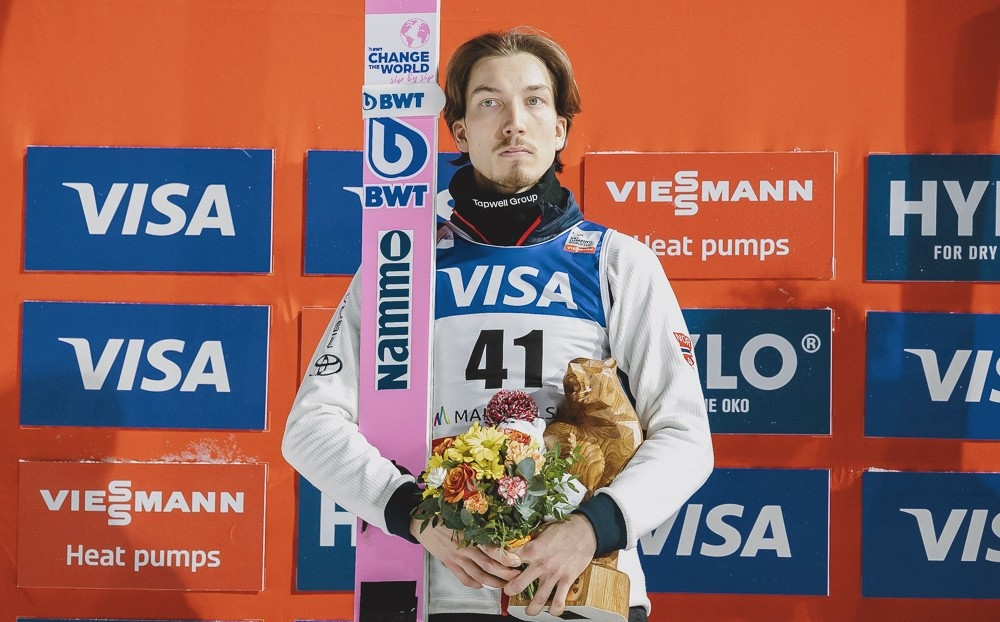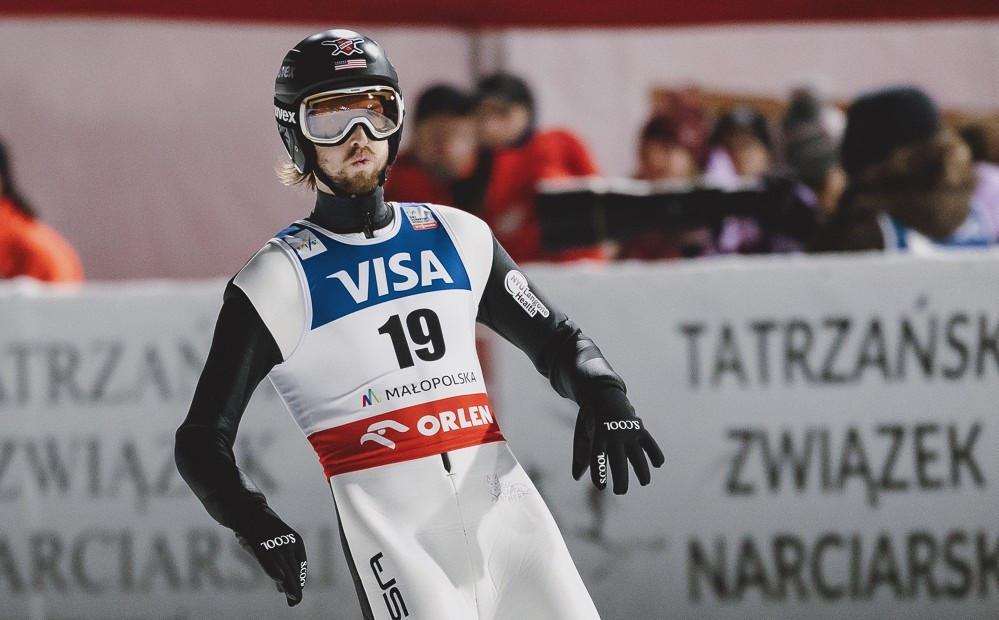Marusyak without goggles in Zakopane, Wonn's fall in Cortina. Highlights from the ski weekend.
Ski Jumping
Week Starts:
Zakopane (Poland), HS 140, team competition
Sunday, January 19
Zakopane (Poland), HS 140, individual tournament
Marusyak Fails to Score in Zakopane
The World Cup in ski jumping resumed after a two-week break with a stage in Zakopane. Despite the geographical proximity, the Ukrainian team arrived in Poland with a reduced roster consisting of just one athlete, Yevhen Marusyak. The team's second member, Vitaliy Kalinichenko, was concurrently competing in the Continental Cup in Bischofshofen, Austria.
It should be noted that only one individual start took place in Zakopane, while on Saturday the first classic team tournament of the season was held, featuring teams of four athletes, which Ukraine would have missed regardless.
Regarding Marusyak's performance in the individual tournament, Yevhen struggled in the strong tailwind that prevailed in Zakopane throughout the weekend, resulting in a poor jump on Sunday. His 47th place was the worst among all 50 participants, considering that three athletes were disqualified.
However, during Friday's training and qualification, the Ukrainian looked quite competitive, finishing 40th, 29th, and 36th respectively. Given Marusyak's ability to perform well at crucial moments, there were reasonable hopes for scoring points, but unfortunately, Yevhen’s Sunday jump was notably unsuccessful—not just in terms of distance but also in landing quality, although he didn't fight much for that, understanding that scoring points was out of reach.
More was expected, especially considering that the Ukrainian team often trains in Zakopane and knows the local hill very well. However, it’s hard to criticize Marusyak for this failure, considering the difficult circumstances he faced while competing in Poland. Recently, he lost his father, so even making it to the start line in such a situation is already a small athletic feat. Particularly recalling the case of Mikaela Shiffrin, who fell into a deep depression after her father's death in 2020 and did not compete for several months.
 9
9This week, the World Cup will feature the first jumps of the season in Oberstdorf, Germany. Knowing Marusyak’s fondness for large hills, Ukrainian fans can look forward to the upcoming weekend with optimism.
As for Vitaliy Kalinichenko, his two-week journey in the Continental Cup ended without points. A week ago, both starts in Klingenthal were canceled due to difficult wind conditions, and in Bischofshofen, Vitaliy finished without scoring points, placing 38th and 45th.
Incidentally, during the Saturday tournament, a small incident occurred with Kalinichenko. There was a glitch in the electronic system, and the Ukrainian was mistakenly awarded maximum style points of 3x20.0 in his first attempt, which would have placed him 25th in the first round and advanced him to the second attempt. However, the error was later corrected, and Kalinichenko was credited with only 49 points from the judges instead of 60, causing him to fall out of the top-30.
This week, Vitaliy will return to the World Cup and compete alongside Marusyak in Oberstdorf. And while Kalinichenko may not be as prominent a jumper as his younger teammate, he also enjoys large hills, so we expect worthy results from him at the "Heini Klopfer Schanze."
Austria's Winning Double in Zakopane
The two-week break between the Four Hills Tournament final and the stage in Zakopane did little to change the balance of power in the elite level of world ski jumping. The Austrian team continued to dominate, securing a winning double in Zakopane.
The Saturday team tournament was the first classic one of the current season. In the paired tournament format (SuperTeam), Austria was still competitive (and Germany successfully did this at the home stage in Neustadt in December, winning), but in the traditional format with four participants per team, it was impossible. Andreas Widhoelzl's team achieved a confident victory, finishing more than 40 points ahead of their closest rivals.
The Sunday individual tournament was won by the freshly crowned Four Hills Tournament champion, Daniel Tschofenig, marking his fifth victory of the current season. Zakopane can be considered a lucky place for the Austrian: it is here that he became the junior world champion and won gold at the 2023 European Games. Although he achieved those successes not on the large hill in Zakopane, but on the adjacent 90-meter hill located a few hundred meters from "Wielka Krokiew."
 0
0However, it cannot be said that absolutely nothing changed in two weeks. For example, Stefan Kraft's form has slightly dipped; he finished only seventh in the individual tournament and looked like the weakest link in the Austrian team during the team event. Kraft still managed to produce some top jumps—such as in the trial round before the Sunday tournament—but he lacked the desired stability and ability to step up at critical moments.
The Slovenian team pleasantly surprised in Zakopane; after a poor first half of the current season, they finished second in the team tournament on Saturday. Lovro Kos significantly improved, although he finished without points in the Sunday individual tournament, placing a disappointing 31st.
Nevertheless, the leader of Robert Hrgota's team was Anze Lanisek, for whom the Sunday individual tournament turned out to be dramatic. In the first attempt, he flew an incredible 145 meters with a great landing—one of the best quality jumps of the current season. The Slovenian took the lead with more than an 11-point advantage over all his pursuers. However, in the second attempt, Lanisek seemed to mentally crumble and failed to maintain his podium position, finishing a disappointing fourth. A painful blow to his psyche, but Lanisek is in great form, and sooner or later victories should come.
Lanisek was not the only one who failed his second attempt on Sunday; another Slovenian, Domen Prevc, also slipped from 13th to 23rd due to a poor second jump.
The top three in Saturday's team tournament was rounded out by Norway, which competed without Marius Lindvik—an expected result considering his weak performances this season. Halvor Egner Granerud looked quite strong on Saturday, but he performed significantly worse in the Sunday individual tournament, finishing just outside the top-20. Recall that Granerud has had a very complicated relationship with the hill in Zakopane; he often faced speed issues on the take-off ramp there.
However, the strongest member of Magnus Brevig's team, as in the Four Hills Tournament, was Johann Andre Forfang. On Sunday, he finally made it to the first podium of the current season. A podium finish was long overdue; Johann had not finished lower than seventh in the Four Hills Tournament.
 1
1The German team remains in a significant decline. While Pius Paschke somewhat salvaged the situation during the Four Hills, he did not have a standout performance in Zakopane. Paschke became the weak link for the Bundestimm in the Saturday team tournament, where his team finished only fourth. On Sunday, Pius even failed to make it to the second attempt for the first time this season, finishing 32nd.
After this, only 8 jumpers from the current season remain in the top-30: this is the Austrian quartet (Tschofenig, Kraft, Ortner, and Jan Hoerl), Andreas Wellinger, Gregor Deschwanden, Kristoffer Eriksen Sundal, and Anze Lanisek. However, this is already an anomalous number for the middle of the season. There have been winter campaigns where such a list remained empty even in Engelberg.
Quite unexpectedly, the leader of the German team in Zakopane was Karl Geiger, who looked solid in the team tournament and finished eighth on Sunday. Philipp Raimund showed good practice jumps, but he looked significantly weaker in official competitions, finishing only 21st on Sunday.
The significant decline of the Polish team in recent years has led to a substantial decrease in interest in ski jumping in the country. This is reflected in television ratings and attendance at the Zakopane stage: this year only 70% of tickets were sold. Just a few years ago, this would have been unimaginable: fans would snatch up all the tickets long before the competitions, and thousands of fans who didn't manage to buy tickets watched the jumps from outside the stadium's territory. However, the lack of a full house in Zakopane is also partly connected to the sharp rise in ticket prices in recent years.
Considering the overall level of the Polish team this season, they managed to perform decently in Zakopane. In the Saturday team tournament, the Poles finished fifth, surpassing, among others, the Swiss team, whom they trail in the overall Nations Cup standings. In the